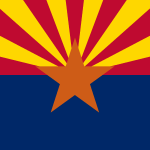Disclaimer: Stories from School Arizona guidelines compel contributors to write about issues, like elections, that impact education and to not write about people, like candidates. Accordingly, any similarity between what follows and real people is coincidental. Cue the laugh track.
Mary tuned off the TV in disgust and threw down the remote. “All these shows are stupid! I’m going to go read my book.” I told her if she didn’t watch, she couldn’t complain. And then the fight began.
Of course we didn’t fight. Why would we? No one would expect anyone to watch stupid shows as a condition to griping about them. So, why then, do people – often teachers – endlessly repeat the most platitudinous of platitudes that if you don’t vote, you can’t complain?
Now, I get the difference between turning off the TV and not voting. The people we elect make the decisions that determine the parameters of our freedom. As Evita (accompanied by an incredibly sexy saxophone) sings to Juan Peron: “But when you act the things you do effect us all.” By comparison, The Real Housewives only effects my digestive track.
Nonetheless, I’m willing to fight anyone who tells me I have to vote. That voting is THE civic duty; that without as close to full participation as possible, we get stuck with inadequate leadership; that close elections come down to only a handful of votes from each district.
First of all, I exercise plenty of civic duties that have a greater impact than my one measly vote – my contributions to charities whose causes I wish to further, for example. I’d immodestly count my writing, too. Perhaps most meaningful would be building a family that doesn’t become an encumbrance on the public.
But forget about me. Inspirational friends, writers, artists, athletes, and teachers(!) mediate the dreams, values, thinking, and civic actions of millions. How does that compare to the single vote each of those luminaries cast?
Moreover, who’s to say that more participation would lead, qualitatively, to better results? If the fifty percent of eligible voters who stay home each election represent a more informed cohort than those who vote, don’t blame them, blame who and what they’re offered to vote for. If they represent a less informed cohort, why would anyone want them voting at all?
And about that close election argument, always made by the losing side: You can’t guarantee that if more people had voted, they’d have voted for your side. Maybe you would have still lost, except by a larger margin.
I’d rather teach a message that puts voting in context. Something like, “Make wise decisions about how and when to vote.” One lesson would include our options when presented choices and candidates you’re not familiar with or don’t like. Another lesson would include a study of the proportional impact of a single vote in different kinds of elections. After all, one’s vote for the local school board counts more, proportionally, than one’s vote for president (and the school board can have significantly more impact on one’s day-to-day life). But whereas everyone can name the presidential candidates, how many can name the school board candidates? (I can for the district I work in but not for the district I vote in.)
Now, I love to vote. I want to vote. I choke up standing in line with soldiers, business people, colleges students, and that guy that looks like Jerry Garcia. Giving consent as one of the governed is a dear gift. But still, without knowledge of the options on the ballot or facing only bad options, I won’t vote. Then, I’ll work to limit the abuses and excesses of whomever is elected. Is that strategy ever taught in schools?
Which brings us a year like 2016, one in which comic entertainers wearing face paint, funny wigs, and baggy clothes compete for our attention – and two clowns compete for our votes. A year like that, as Jonah Goldberg says, is like looking at a menu listing two [expletive] sandwiches on different kinds of bread. Nothing is irresponsible about walking out of that restaurant. Likewise, a fair argument can be made that the most civic thing to do is to tell the major parties that we ain’t ordering from their menu until they offer a more nutritious selection.
But most people will order off the menu. They’ll claim that Thing 1 isn’t perfect but Thing 2 will put us on the express lane to the Apocalypse. So, on November 9, we’ll wake up and say, as two twentysomethings might say as they wake up, look across the sheets, and see who they’ve fallen into bed with during a night of youthful indiscretion, “Seriously?”
Yes, seriously. But the real question is: What now?
To which the answer is yet a third question: Are we Walter White or Jesse Pinkman? In Breaking Bad, for the uninitiated (and ignoring the meth-empire they built), Walter revealed, layer-by-layer, the evil residing at his core. Jesse, starting at less than zero, developed, at great cost, the good residing at his.
If the answer is Walter, we’re sunk. But I think the answer is Jesse. I think that as we get out of bed after the election and wash the debauchery of 2016 out of our sheets, we’ll commit the good that remains to (re)building a nation that aligns with our individual and collective ideals.
And teachers will carry a heavier portion of that load than most.









Comments 2
Sandy, you are a terrific writer. I always enjoy reading your posts– I also equally enjoy disagreeing!
Here are some things to consider:
1) Roughly 28% of eligible voters participated in the primaries.
http://www.pewresearch.org/fact-tank/2016/06/10/turnout-was-high-in-the-2016-primary-season-but-just-short-of-2008-record/
TWENTY EIGHT PERCENT, SANDY! You certainly have a point that we don’t want to send people to the polls simply to send them there (remember Puff Daddy’s Rock the Vote campaign: ha!), but we need to encourage people to be involved in the whole process. You touched on this idea when you mentioned the school board elections.
2) Voter turn out for the presidential election (still tabulating) was approx. 40-50%:
http://billmoyers.com/story/numbers-americans-election-day-voting/
You mentioned this too. Again, we don’t want to send the uninformed, but I believe to the core of my being that we need to battle systemic apathy. The concept of simply waiting around to see what happens because “I don’t care” IS a crime. Bystanding is an action! Inaction IS an action!
3) On the topic of uneducated voters, consider this: “Trump’s most significant support came from counties in the industrial Midwest where whites without a college education are the majority.”
http://www.nytimes.com/interactive/2016/11/08/us/elections/how-trump-pushed-the-election-map-to-the-right.html?action=click&pgtype=Homepage&clickSource=g-artboard%20g-artboard-v3%20&module=span-abc-region®ion=span-abc-
Thus, this idea of “don’t send the ill informed is ALREADY happening”. I don’t know the rhetorical term for this: passion-inspired democracy? People don’t just vote because they feel “educated” or “prepared”– they vote because they believe in supporting a candidate who will support them (in some way, shape, or form).
4) “Don’t vote? Don’t complain” is NOT a platitude– it is essential to the origins of democracy!
“The citizens and inhabitants of Greek city states were generally far too aware of the social base of their personal lives to simply ignore the politics of the community on which they depended. An individual who retreated from politics and public life was called an “idiot”–a person who lacks the knowledge and social skills that mature individuals can be expected to possess. Even Socrates, an outspoken individualist, had always been concerned with Athens as a community”
http://faculty.frostburg.edu/phil/forum/PlatoRep.htm
Former Greek Prime Minister George Papandreou analyzes this concept in his TEDTalk when he alludes to the fact that the Greeks believed there was “a wisdom of the crowd” because “democracy cannot work without the participation of crowds to deliberate and participate”. Please consider watching this talk if you have 20 minutes:
https://www.ted.com/talks/george_papandreou_imagine_a_european_democracy_without_borders#t-716745
5) Finally, Athenians believed that idiots were born and citizens were made through education. That is to say, the expectation of all people to vote is synonymous with the expectation that all citizens become educated. In the United States, not only is education mandatory, so too is the expectation for successful education. Thus the mantra: “No child left behind….”
Eagerly awaiting your response…
Wow… What a new way to step back and look at what this means. I appreciate your perspective and your willingness to say what you needed to say with the humor and pointedness that you did. This may not be your most popular blog, but your willingness to speak your truth is great. I may not agree with the points made here, but I respect you Sandy and the insights you share and the way that they help me see through your lens.